Challenges & Opportunities in Transitioning to Advanced Nursing Roles
VerifiedAdded on 2023/06/03
|7
|1613
|261
Essay
AI Summary
This essay discusses the complexities of transitioning from a registered nurse to an advanced registered nurse, focusing on the challenges and opportunities within the profession. It highlights the importance of adapting to changing laws and policies, understanding job roles, and maintaining professional standards. The author, a registered nurse in a cardiac/telemetry unit aspiring to specialize in nursing informatics, outlines the necessary education, certifications, and practical experience required for advancement. The essay also emphasizes the influence of professional nursing organizations like the National Association for Clinical Nurse Specialists in expanding nursing practice. Furthermore, it addresses the impact of key policies such as licensure, accreditation, and the Affordable Care Act on advanced nursing practice, concluding that continuous skill development and knowledge of legislative trends are crucial for achieving positive patient outcomes and professional growth. Desklib provides a platform to access similar solved assignments and resources for students.
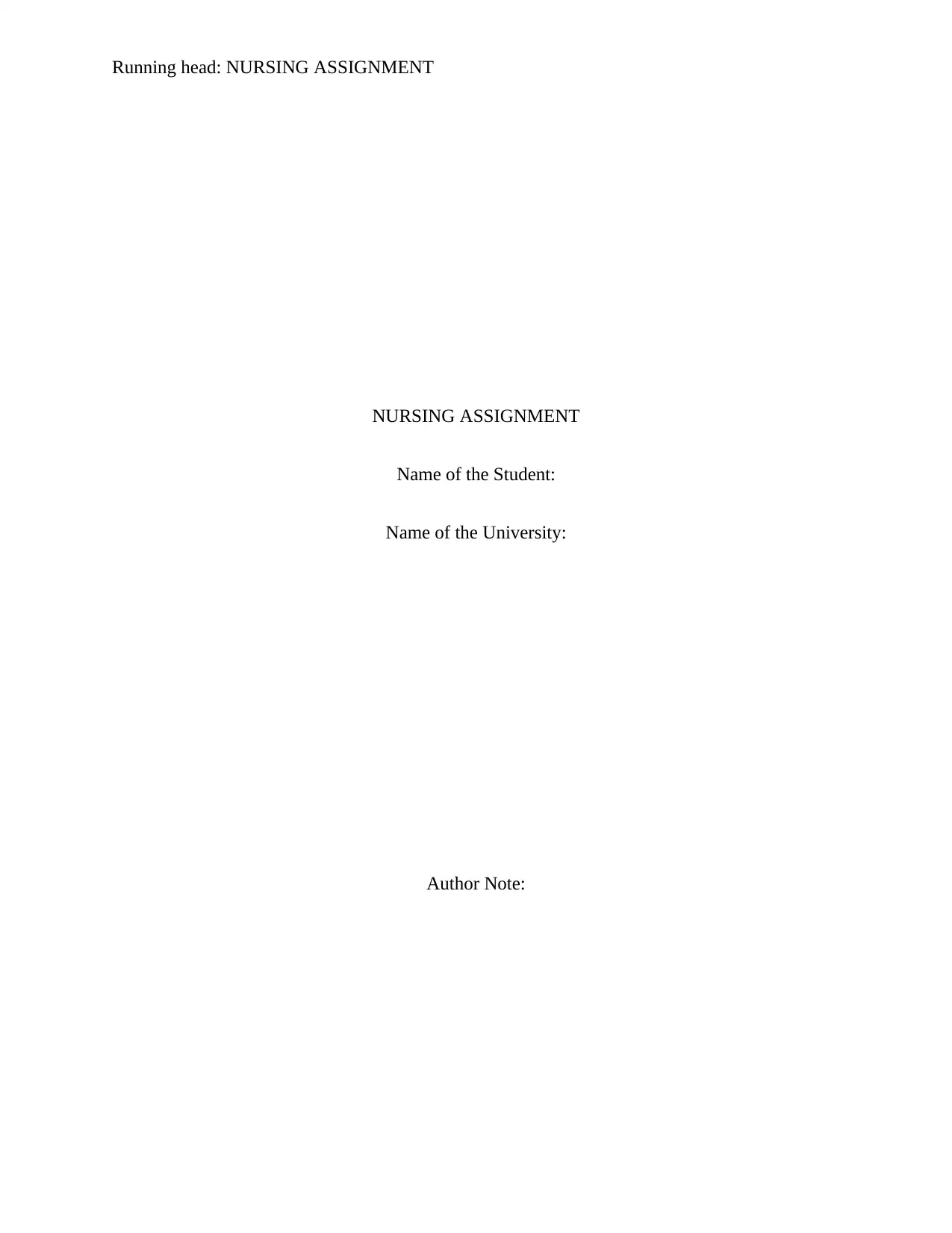
Running head: NURSING ASSIGNMENT
NURSING ASSIGNMENT
Name of the Student:
Name of the University:
Author Note:
NURSING ASSIGNMENT
Name of the Student:
Name of the University:
Author Note:
Paraphrase This Document
Need a fresh take? Get an instant paraphrase of this document with our AI Paraphraser
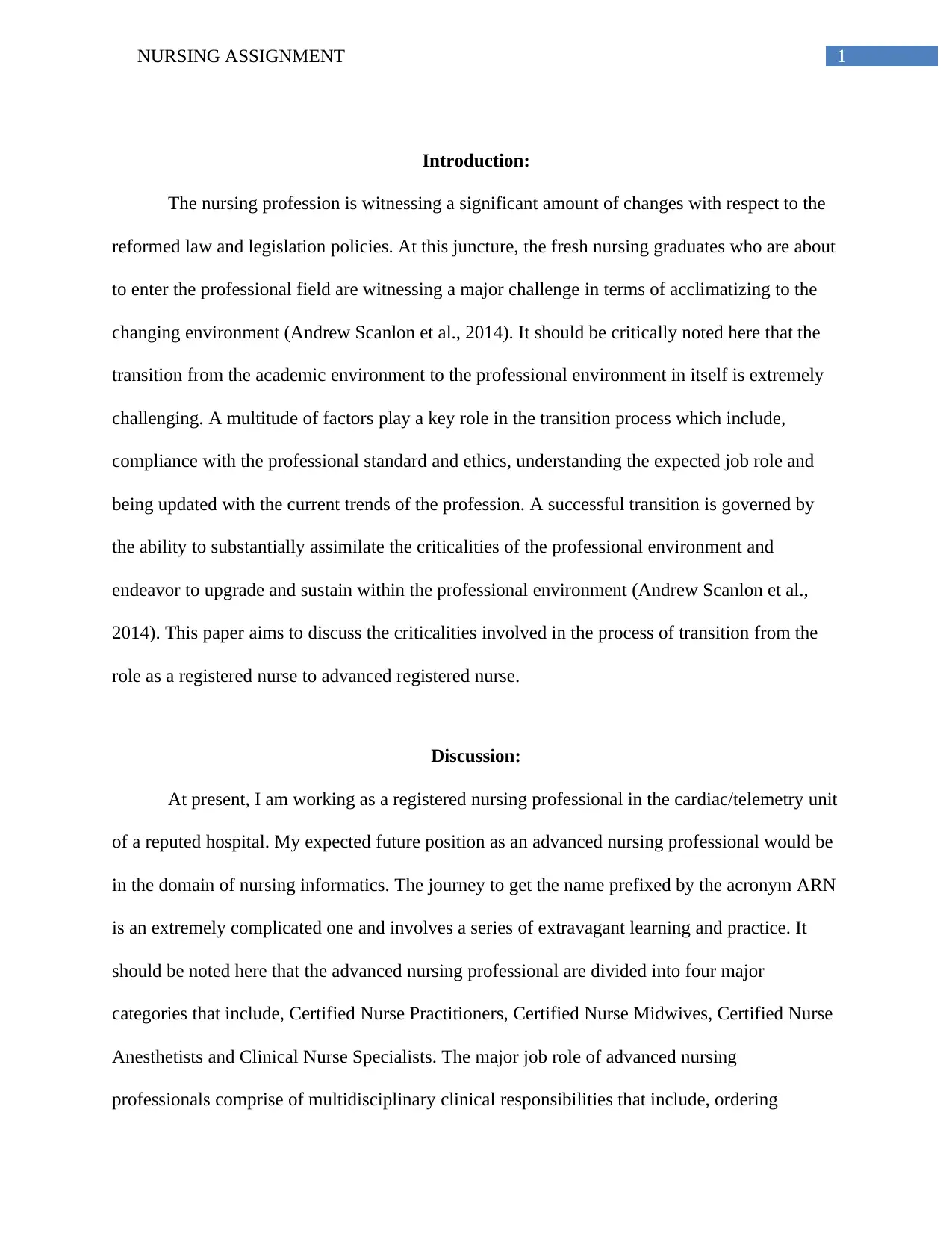
1NURSING ASSIGNMENT
Introduction:
The nursing profession is witnessing a significant amount of changes with respect to the
reformed law and legislation policies. At this juncture, the fresh nursing graduates who are about
to enter the professional field are witnessing a major challenge in terms of acclimatizing to the
changing environment (Andrew Scanlon et al., 2014). It should be critically noted here that the
transition from the academic environment to the professional environment in itself is extremely
challenging. A multitude of factors play a key role in the transition process which include,
compliance with the professional standard and ethics, understanding the expected job role and
being updated with the current trends of the profession. A successful transition is governed by
the ability to substantially assimilate the criticalities of the professional environment and
endeavor to upgrade and sustain within the professional environment (Andrew Scanlon et al.,
2014). This paper aims to discuss the criticalities involved in the process of transition from the
role as a registered nurse to advanced registered nurse.
Discussion:
At present, I am working as a registered nursing professional in the cardiac/telemetry unit
of a reputed hospital. My expected future position as an advanced nursing professional would be
in the domain of nursing informatics. The journey to get the name prefixed by the acronym ARN
is an extremely complicated one and involves a series of extravagant learning and practice. It
should be noted here that the advanced nursing professional are divided into four major
categories that include, Certified Nurse Practitioners, Certified Nurse Midwives, Certified Nurse
Anesthetists and Clinical Nurse Specialists. The major job role of advanced nursing
professionals comprise of multidisciplinary clinical responsibilities that include, ordering
Introduction:
The nursing profession is witnessing a significant amount of changes with respect to the
reformed law and legislation policies. At this juncture, the fresh nursing graduates who are about
to enter the professional field are witnessing a major challenge in terms of acclimatizing to the
changing environment (Andrew Scanlon et al., 2014). It should be critically noted here that the
transition from the academic environment to the professional environment in itself is extremely
challenging. A multitude of factors play a key role in the transition process which include,
compliance with the professional standard and ethics, understanding the expected job role and
being updated with the current trends of the profession. A successful transition is governed by
the ability to substantially assimilate the criticalities of the professional environment and
endeavor to upgrade and sustain within the professional environment (Andrew Scanlon et al.,
2014). This paper aims to discuss the criticalities involved in the process of transition from the
role as a registered nurse to advanced registered nurse.
Discussion:
At present, I am working as a registered nursing professional in the cardiac/telemetry unit
of a reputed hospital. My expected future position as an advanced nursing professional would be
in the domain of nursing informatics. The journey to get the name prefixed by the acronym ARN
is an extremely complicated one and involves a series of extravagant learning and practice. It
should be noted here that the advanced nursing professional are divided into four major
categories that include, Certified Nurse Practitioners, Certified Nurse Midwives, Certified Nurse
Anesthetists and Clinical Nurse Specialists. The major job role of advanced nursing
professionals comprise of multidisciplinary clinical responsibilities that include, ordering
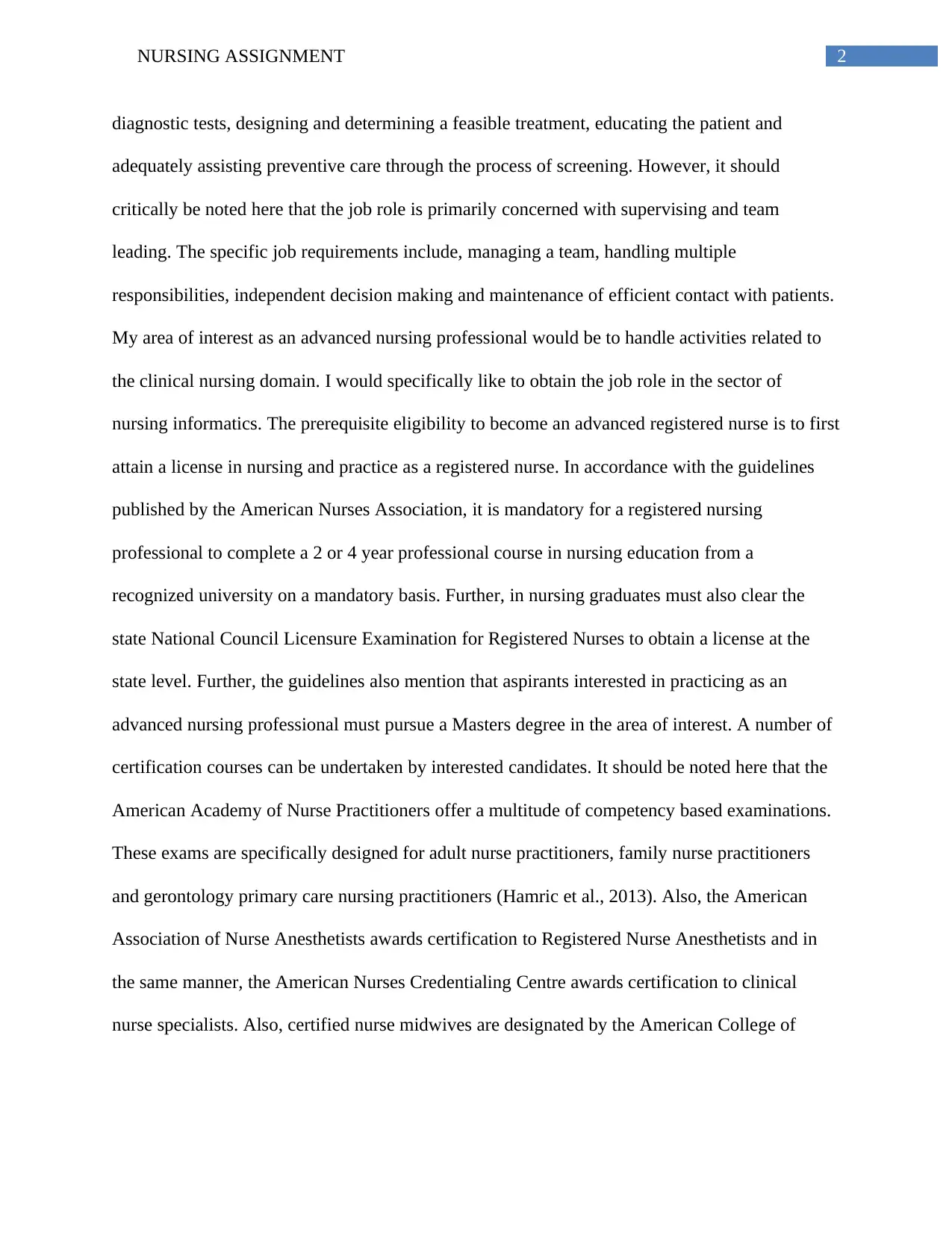
2NURSING ASSIGNMENT
diagnostic tests, designing and determining a feasible treatment, educating the patient and
adequately assisting preventive care through the process of screening. However, it should
critically be noted here that the job role is primarily concerned with supervising and team
leading. The specific job requirements include, managing a team, handling multiple
responsibilities, independent decision making and maintenance of efficient contact with patients.
My area of interest as an advanced nursing professional would be to handle activities related to
the clinical nursing domain. I would specifically like to obtain the job role in the sector of
nursing informatics. The prerequisite eligibility to become an advanced registered nurse is to first
attain a license in nursing and practice as a registered nurse. In accordance with the guidelines
published by the American Nurses Association, it is mandatory for a registered nursing
professional to complete a 2 or 4 year professional course in nursing education from a
recognized university on a mandatory basis. Further, in nursing graduates must also clear the
state National Council Licensure Examination for Registered Nurses to obtain a license at the
state level. Further, the guidelines also mention that aspirants interested in practicing as an
advanced nursing professional must pursue a Masters degree in the area of interest. A number of
certification courses can be undertaken by interested candidates. It should be noted here that the
American Academy of Nurse Practitioners offer a multitude of competency based examinations.
These exams are specifically designed for adult nurse practitioners, family nurse practitioners
and gerontology primary care nursing practitioners (Hamric et al., 2013). Also, the American
Association of Nurse Anesthetists awards certification to Registered Nurse Anesthetists and in
the same manner, the American Nurses Credentialing Centre awards certification to clinical
nurse specialists. Also, certified nurse midwives are designated by the American College of
diagnostic tests, designing and determining a feasible treatment, educating the patient and
adequately assisting preventive care through the process of screening. However, it should
critically be noted here that the job role is primarily concerned with supervising and team
leading. The specific job requirements include, managing a team, handling multiple
responsibilities, independent decision making and maintenance of efficient contact with patients.
My area of interest as an advanced nursing professional would be to handle activities related to
the clinical nursing domain. I would specifically like to obtain the job role in the sector of
nursing informatics. The prerequisite eligibility to become an advanced registered nurse is to first
attain a license in nursing and practice as a registered nurse. In accordance with the guidelines
published by the American Nurses Association, it is mandatory for a registered nursing
professional to complete a 2 or 4 year professional course in nursing education from a
recognized university on a mandatory basis. Further, in nursing graduates must also clear the
state National Council Licensure Examination for Registered Nurses to obtain a license at the
state level. Further, the guidelines also mention that aspirants interested in practicing as an
advanced nursing professional must pursue a Masters degree in the area of interest. A number of
certification courses can be undertaken by interested candidates. It should be noted here that the
American Academy of Nurse Practitioners offer a multitude of competency based examinations.
These exams are specifically designed for adult nurse practitioners, family nurse practitioners
and gerontology primary care nursing practitioners (Hamric et al., 2013). Also, the American
Association of Nurse Anesthetists awards certification to Registered Nurse Anesthetists and in
the same manner, the American Nurses Credentialing Centre awards certification to clinical
nurse specialists. Also, certified nurse midwives are designated by the American College of
⊘ This is a preview!⊘
Do you want full access?
Subscribe today to unlock all pages.

Trusted by 1+ million students worldwide
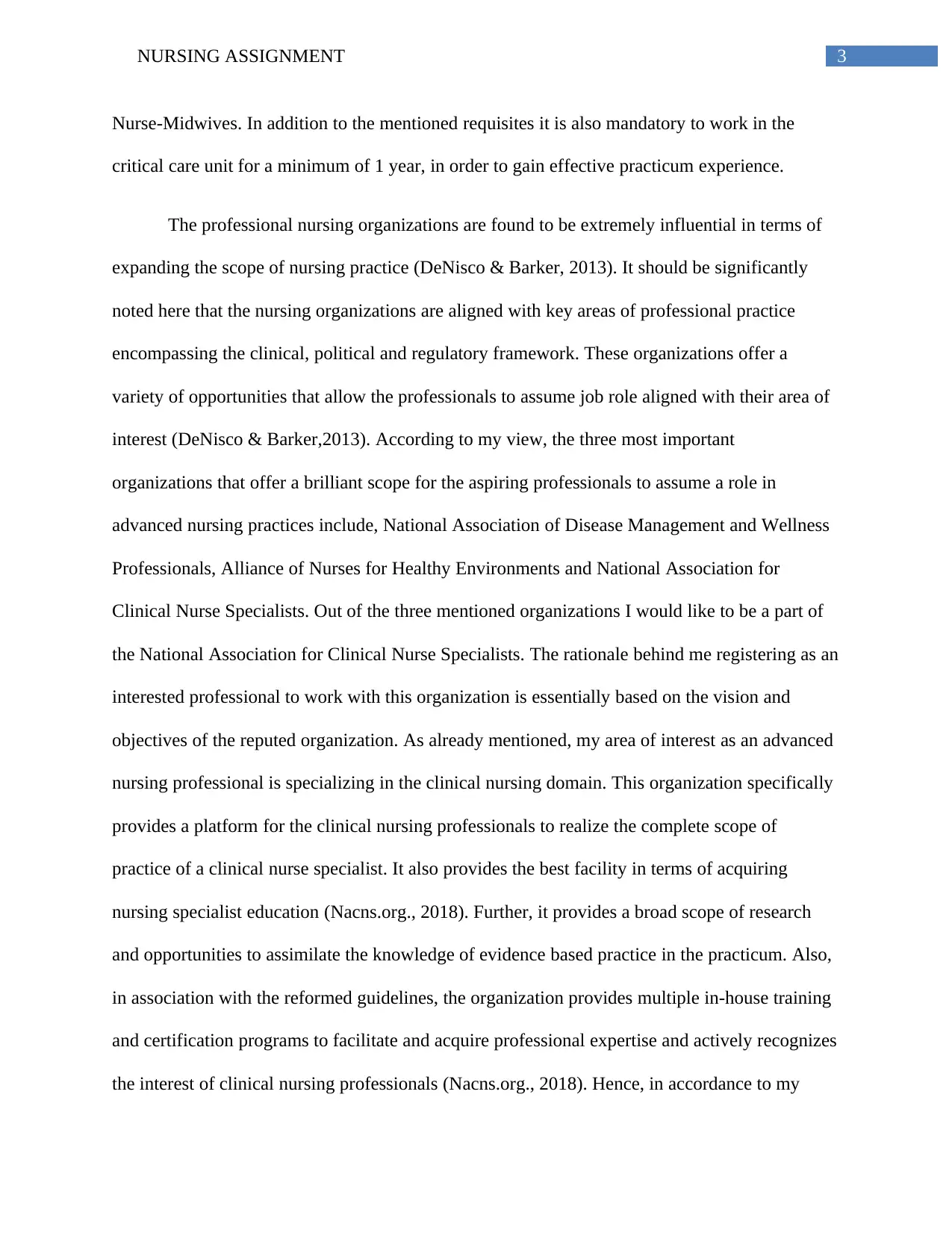
3NURSING ASSIGNMENT
Nurse-Midwives. In addition to the mentioned requisites it is also mandatory to work in the
critical care unit for a minimum of 1 year, in order to gain effective practicum experience.
The professional nursing organizations are found to be extremely influential in terms of
expanding the scope of nursing practice (DeNisco & Barker, 2013). It should be significantly
noted here that the nursing organizations are aligned with key areas of professional practice
encompassing the clinical, political and regulatory framework. These organizations offer a
variety of opportunities that allow the professionals to assume job role aligned with their area of
interest (DeNisco & Barker,2013). According to my view, the three most important
organizations that offer a brilliant scope for the aspiring professionals to assume a role in
advanced nursing practices include, National Association of Disease Management and Wellness
Professionals, Alliance of Nurses for Healthy Environments and National Association for
Clinical Nurse Specialists. Out of the three mentioned organizations I would like to be a part of
the National Association for Clinical Nurse Specialists. The rationale behind me registering as an
interested professional to work with this organization is essentially based on the vision and
objectives of the reputed organization. As already mentioned, my area of interest as an advanced
nursing professional is specializing in the clinical nursing domain. This organization specifically
provides a platform for the clinical nursing professionals to realize the complete scope of
practice of a clinical nurse specialist. It also provides the best facility in terms of acquiring
nursing specialist education (Nacns.org., 2018). Further, it provides a broad scope of research
and opportunities to assimilate the knowledge of evidence based practice in the practicum. Also,
in association with the reformed guidelines, the organization provides multiple in-house training
and certification programs to facilitate and acquire professional expertise and actively recognizes
the interest of clinical nursing professionals (Nacns.org., 2018). Hence, in accordance to my
Nurse-Midwives. In addition to the mentioned requisites it is also mandatory to work in the
critical care unit for a minimum of 1 year, in order to gain effective practicum experience.
The professional nursing organizations are found to be extremely influential in terms of
expanding the scope of nursing practice (DeNisco & Barker, 2013). It should be significantly
noted here that the nursing organizations are aligned with key areas of professional practice
encompassing the clinical, political and regulatory framework. These organizations offer a
variety of opportunities that allow the professionals to assume job role aligned with their area of
interest (DeNisco & Barker,2013). According to my view, the three most important
organizations that offer a brilliant scope for the aspiring professionals to assume a role in
advanced nursing practices include, National Association of Disease Management and Wellness
Professionals, Alliance of Nurses for Healthy Environments and National Association for
Clinical Nurse Specialists. Out of the three mentioned organizations I would like to be a part of
the National Association for Clinical Nurse Specialists. The rationale behind me registering as an
interested professional to work with this organization is essentially based on the vision and
objectives of the reputed organization. As already mentioned, my area of interest as an advanced
nursing professional is specializing in the clinical nursing domain. This organization specifically
provides a platform for the clinical nursing professionals to realize the complete scope of
practice of a clinical nurse specialist. It also provides the best facility in terms of acquiring
nursing specialist education (Nacns.org., 2018). Further, it provides a broad scope of research
and opportunities to assimilate the knowledge of evidence based practice in the practicum. Also,
in association with the reformed guidelines, the organization provides multiple in-house training
and certification programs to facilitate and acquire professional expertise and actively recognizes
the interest of clinical nursing professionals (Nacns.org., 2018). Hence, in accordance to my
Paraphrase This Document
Need a fresh take? Get an instant paraphrase of this document with our AI Paraphraser
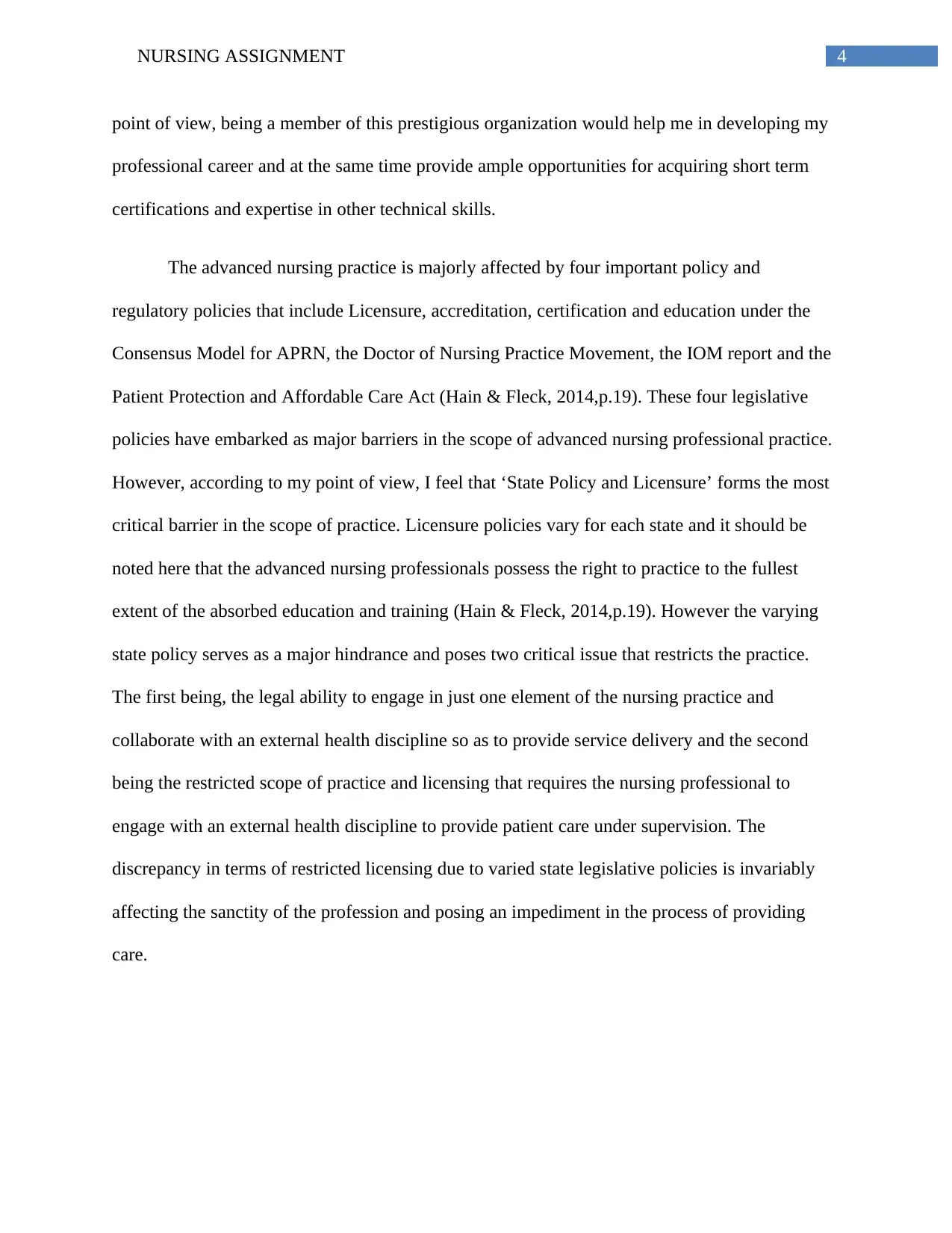
4NURSING ASSIGNMENT
point of view, being a member of this prestigious organization would help me in developing my
professional career and at the same time provide ample opportunities for acquiring short term
certifications and expertise in other technical skills.
The advanced nursing practice is majorly affected by four important policy and
regulatory policies that include Licensure, accreditation, certification and education under the
Consensus Model for APRN, the Doctor of Nursing Practice Movement, the IOM report and the
Patient Protection and Affordable Care Act (Hain & Fleck, 2014,p.19). These four legislative
policies have embarked as major barriers in the scope of advanced nursing professional practice.
However, according to my point of view, I feel that ‘State Policy and Licensure’ forms the most
critical barrier in the scope of practice. Licensure policies vary for each state and it should be
noted here that the advanced nursing professionals possess the right to practice to the fullest
extent of the absorbed education and training (Hain & Fleck, 2014,p.19). However the varying
state policy serves as a major hindrance and poses two critical issue that restricts the practice.
The first being, the legal ability to engage in just one element of the nursing practice and
collaborate with an external health discipline so as to provide service delivery and the second
being the restricted scope of practice and licensing that requires the nursing professional to
engage with an external health discipline to provide patient care under supervision. The
discrepancy in terms of restricted licensing due to varied state legislative policies is invariably
affecting the sanctity of the profession and posing an impediment in the process of providing
care.
point of view, being a member of this prestigious organization would help me in developing my
professional career and at the same time provide ample opportunities for acquiring short term
certifications and expertise in other technical skills.
The advanced nursing practice is majorly affected by four important policy and
regulatory policies that include Licensure, accreditation, certification and education under the
Consensus Model for APRN, the Doctor of Nursing Practice Movement, the IOM report and the
Patient Protection and Affordable Care Act (Hain & Fleck, 2014,p.19). These four legislative
policies have embarked as major barriers in the scope of advanced nursing professional practice.
However, according to my point of view, I feel that ‘State Policy and Licensure’ forms the most
critical barrier in the scope of practice. Licensure policies vary for each state and it should be
noted here that the advanced nursing professionals possess the right to practice to the fullest
extent of the absorbed education and training (Hain & Fleck, 2014,p.19). However the varying
state policy serves as a major hindrance and poses two critical issue that restricts the practice.
The first being, the legal ability to engage in just one element of the nursing practice and
collaborate with an external health discipline so as to provide service delivery and the second
being the restricted scope of practice and licensing that requires the nursing professional to
engage with an external health discipline to provide patient care under supervision. The
discrepancy in terms of restricted licensing due to varied state legislative policies is invariably
affecting the sanctity of the profession and posing an impediment in the process of providing
care.
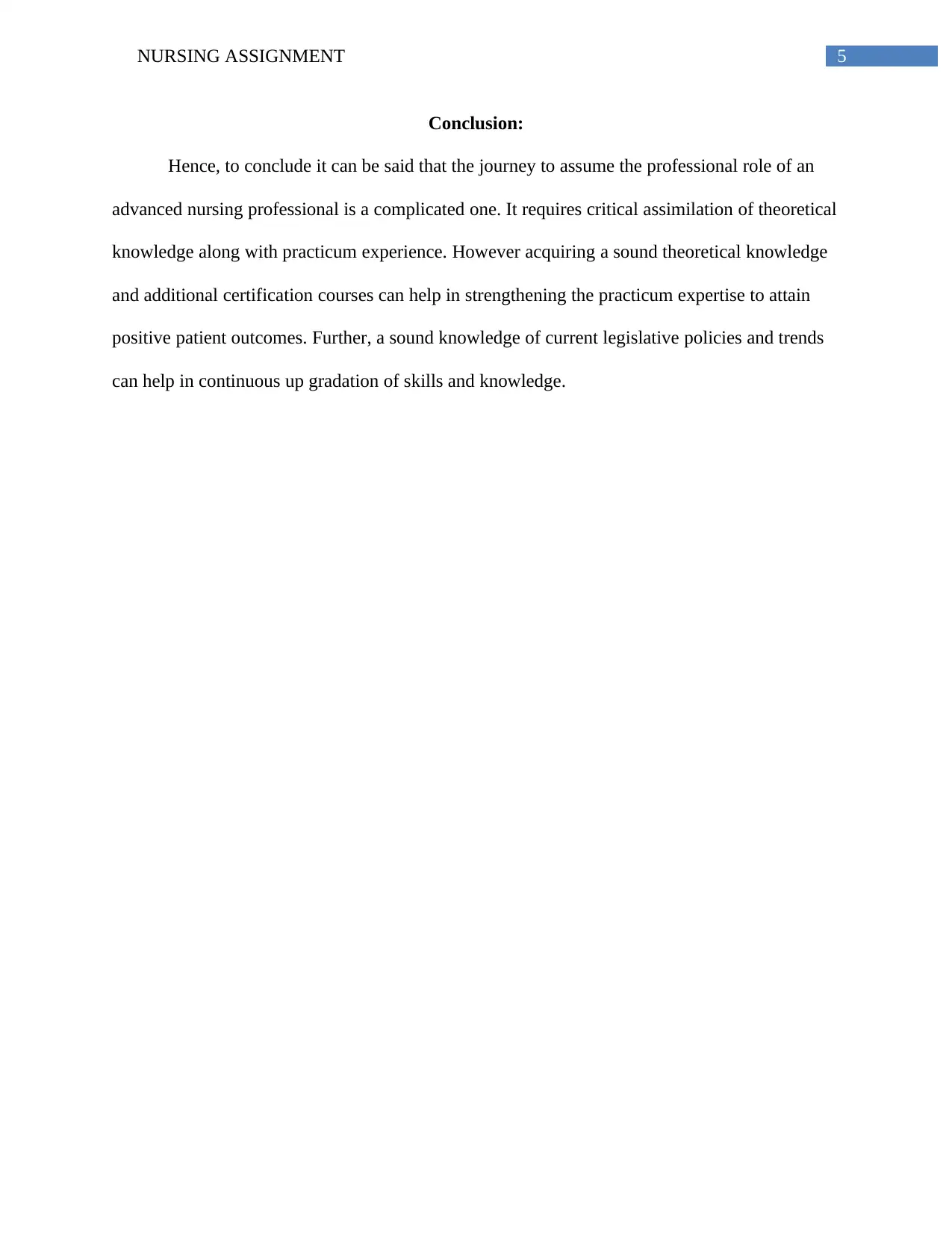
5NURSING ASSIGNMENT
Conclusion:
Hence, to conclude it can be said that the journey to assume the professional role of an
advanced nursing professional is a complicated one. It requires critical assimilation of theoretical
knowledge along with practicum experience. However acquiring a sound theoretical knowledge
and additional certification courses can help in strengthening the practicum expertise to attain
positive patient outcomes. Further, a sound knowledge of current legislative policies and trends
can help in continuous up gradation of skills and knowledge.
Conclusion:
Hence, to conclude it can be said that the journey to assume the professional role of an
advanced nursing professional is a complicated one. It requires critical assimilation of theoretical
knowledge along with practicum experience. However acquiring a sound theoretical knowledge
and additional certification courses can help in strengthening the practicum expertise to attain
positive patient outcomes. Further, a sound knowledge of current legislative policies and trends
can help in continuous up gradation of skills and knowledge.
⊘ This is a preview!⊘
Do you want full access?
Subscribe today to unlock all pages.

Trusted by 1+ million students worldwide
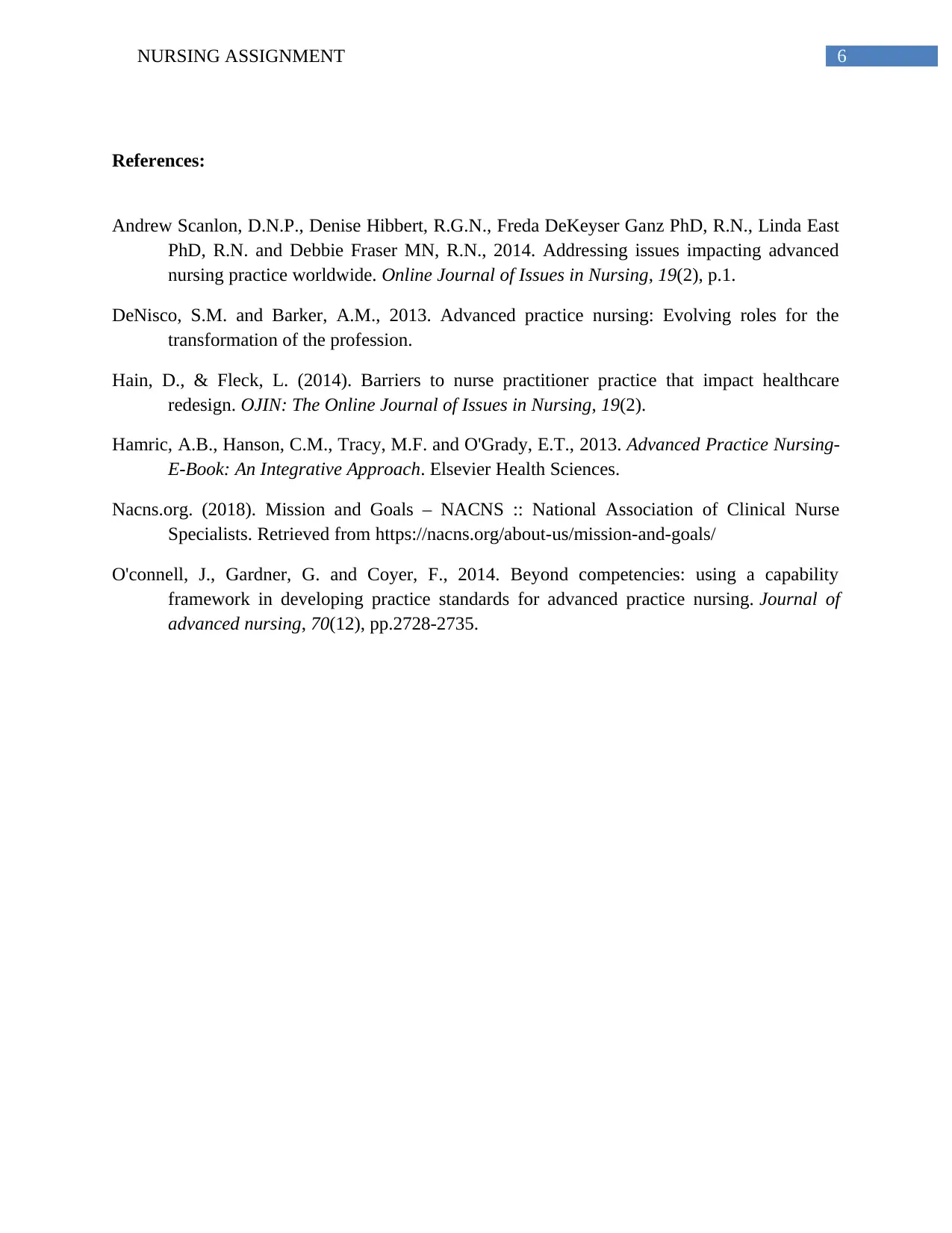
6NURSING ASSIGNMENT
References:
Andrew Scanlon, D.N.P., Denise Hibbert, R.G.N., Freda DeKeyser Ganz PhD, R.N., Linda East
PhD, R.N. and Debbie Fraser MN, R.N., 2014. Addressing issues impacting advanced
nursing practice worldwide. Online Journal of Issues in Nursing, 19(2), p.1.
DeNisco, S.M. and Barker, A.M., 2013. Advanced practice nursing: Evolving roles for the
transformation of the profession.
Hain, D., & Fleck, L. (2014). Barriers to nurse practitioner practice that impact healthcare
redesign. OJIN: The Online Journal of Issues in Nursing, 19(2).
Hamric, A.B., Hanson, C.M., Tracy, M.F. and O'Grady, E.T., 2013. Advanced Practice Nursing-
E-Book: An Integrative Approach. Elsevier Health Sciences.
Nacns.org. (2018). Mission and Goals – NACNS :: National Association of Clinical Nurse
Specialists. Retrieved from https://nacns.org/about-us/mission-and-goals/
O'connell, J., Gardner, G. and Coyer, F., 2014. Beyond competencies: using a capability
framework in developing practice standards for advanced practice nursing. Journal of
advanced nursing, 70(12), pp.2728-2735.
References:
Andrew Scanlon, D.N.P., Denise Hibbert, R.G.N., Freda DeKeyser Ganz PhD, R.N., Linda East
PhD, R.N. and Debbie Fraser MN, R.N., 2014. Addressing issues impacting advanced
nursing practice worldwide. Online Journal of Issues in Nursing, 19(2), p.1.
DeNisco, S.M. and Barker, A.M., 2013. Advanced practice nursing: Evolving roles for the
transformation of the profession.
Hain, D., & Fleck, L. (2014). Barriers to nurse practitioner practice that impact healthcare
redesign. OJIN: The Online Journal of Issues in Nursing, 19(2).
Hamric, A.B., Hanson, C.M., Tracy, M.F. and O'Grady, E.T., 2013. Advanced Practice Nursing-
E-Book: An Integrative Approach. Elsevier Health Sciences.
Nacns.org. (2018). Mission and Goals – NACNS :: National Association of Clinical Nurse
Specialists. Retrieved from https://nacns.org/about-us/mission-and-goals/
O'connell, J., Gardner, G. and Coyer, F., 2014. Beyond competencies: using a capability
framework in developing practice standards for advanced practice nursing. Journal of
advanced nursing, 70(12), pp.2728-2735.
1 out of 7
Related Documents
Your All-in-One AI-Powered Toolkit for Academic Success.
+13062052269
info@desklib.com
Available 24*7 on WhatsApp / Email
![[object Object]](/_next/static/media/star-bottom.7253800d.svg)
Unlock your academic potential
Copyright © 2020–2025 A2Z Services. All Rights Reserved. Developed and managed by ZUCOL.





